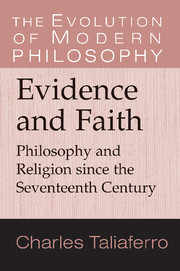Book contents
- Frontmatter
- Contents
- Acknowledgments
- Introduction
- 1 The Sovereignty of the Good in Seventeenth-Century Philosophy of Religion
- 2 Cartesian Philosophy of Religion
- 3 The Ascendancy of Rules of Evidence in Early Modern Philosophy of Religion
- 4 Humean Philosophy of Religion
- 5 Kantian Philosophy of Religion
- 6 Religion and the Philosophical Gods and Giants
- 7 Continental and Feminist Philosophy of Religion
- 8 Five Major Moves
- 9 Religions, Evidence, and Legitimacy
- Appendix A A Guide to Further Study
- Appendix B Select Contemporary Philosophers
- Select Bibliography
- Index
2 - Cartesian Philosophy of Religion
Published online by Cambridge University Press: 15 December 2009
- Frontmatter
- Contents
- Acknowledgments
- Introduction
- 1 The Sovereignty of the Good in Seventeenth-Century Philosophy of Religion
- 2 Cartesian Philosophy of Religion
- 3 The Ascendancy of Rules of Evidence in Early Modern Philosophy of Religion
- 4 Humean Philosophy of Religion
- 5 Kantian Philosophy of Religion
- 6 Religion and the Philosophical Gods and Giants
- 7 Continental and Feminist Philosophy of Religion
- 8 Five Major Moves
- 9 Religions, Evidence, and Legitimacy
- Appendix A A Guide to Further Study
- Appendix B Select Contemporary Philosophers
- Select Bibliography
- Index
Summary
Notwithstanding the immense goodness of God, the nature of man as a combination of mind and body is such that it is bound to mislead him from time to time.
DescartesDescartes and a Queen
On February 11, 1650, René Descartes, the person most often identified as the father of modern European philosophy, died in Sweden. The month before, he had written to a friend, “I am not in my element here.” Descartes, born in 1596 in southern France, was a celebrated philosopher at the time of his death, though also the subject of sustained criticism. He went to Stockholm at the request of Queen Christina (1626–1689) in order to tutor her in philosophy. They had corresponded on metaphysics and the nature and value of love. The fierce cold, a rigorous early morning schedule, and, in the end, pneumonia proved fatal.
Descartes' short-lived but cordial relationship with the queen reflected his enthusiasm for philosophical dialogue with women at a time when women were still excluded from a formal, higher education. The first correspondence between Christina and Descartes involved themes that were close to the heart of Cambridge Platonists. “The goodness of each thing,” Descartes wrote in 1647, “can be considered in itself without reference to anything else, and in this sense it is evident that God is the supreme good, since he is incomparably more perfect than any creature.” Descartes went on to extol the goodness of freedom and the additional good of things in relation to greater goods.
- Type
- Chapter
- Information
- Evidence and FaithPhilosophy and Religion since the Seventeenth Century, pp. 57 - 109Publisher: Cambridge University PressPrint publication year: 2005



